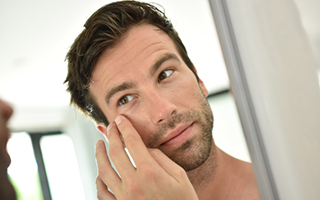Vitiligo
Get Help for Patchy Loss of Pigment in Bryn Mawr, Newtown Square, Philadelphia, and the Main Line
While chronic loss of skin color is most obvious in darker-skinned people, anyone can develop the melanin-altering disease known as vitiligo. Bryn Mawr Skin & Cancer Institute works with these patients to restore a more even pigmentation. While there is no cure for this dermatological condition, its effects can be mitigated.
Vitiligo is not a communicable disease. While it is typically only a cosmetic disorder, the lightening of a skin can be the source of psychological distress. It can also make skin more prone to sunburn and may be associated with eye and healing problems. Anyone dealing with vitiligo—whether a small patch of lighter skin or large and very noticeable areas where pigment is scarce—is encouraged to contact a dermatologist for diagnosis, treatment of symptoms, and plans for dealing with potential future symptoms.
Bryn Mawr Skin & Cancer Institute can advise you about identifying and managing symptoms of vitiligo. To schedule an appointment, Please BOOK ONLINE, call 610.525.5028, or Contact Us.
What Causes Vitiligo?
Color in the skin comes from specialized cells known as “melanocytes,” which produce pigment. If significant numbers of these cells begin to shut down, cease functioning, or die, light patches can appear and spread.
While doctors know that vitiligo impacts melanocytes, they do not know what triggers the disease in the first place. It may be heredity, an autoimmune condition, stress, or damage to the skin, as with a severe sunburn or exposure to certain chemicals.
What Are the Symptoms of Vitiligo?
The primary sign is loss of color in the skin, with lighter-pigmented areas appearing as patches. This pigment loss typically begins on the hands and face, as well as the genital region, but can develop anywhere on the body. Other symptoms include hair turning white or gray on the scalp or face—including eyelashes—and the mucous membranes in your mouth and nose losing their color.
There are several varieties of this disease:
Generalized Vitiligo
This most common form of the disease is marked by light patches that tend to develop symmetrically.
Acrofacial Vitiligo
This form typically impacts only the hands and face, especially the eyes, nose, ears, and other openings in the body.
Localized or Focal Vitiligo
For this type, patches appear on just a few areas, or just a single part of the body.
Segmental Vitiligo
Most often seen in younger people, this form manifests as patches that grow on one side or part of the body for a year or two before stopping.
Universal Vitiligo
As the name implies, this type causes virtually all of the surface of the skin to lose its color.

Meet Our Dermatologists &
Certified Physician Assistants
Our board-certified dermatologists & PA-Cs are dedicated to detecting and treating skin cancers. We treat the full spectrum of skin diseases. Our Mohs and Plastic Surgery practices are integrated, and offer patients the most advanced skin cancer treatment, delivering superior outcomes.
Who Is at Risk for Developing Vitiligo?
Patchy pigment loss can be a problem for women and men of all ages and skin colors, although the contrast between natural coloring and the impacted areas is more noticeable in patients with darker skin. Symptoms often develop in a person’s 20s, but can occur earlier or later. Up to 1 percent of the world’s population is estimated to live with this condition.
Treatment Options for Vitiligo
There is no cure for vitiligo, but there are treatments that can create more even skin coloration. Certain medications can restore skin color over time in small areas. Light treatments can be applied to stimulate melanocytes and raise pigment levels in the skin.
The ideal treatment for a patient will depend on the type of pigment loss, as well as its location and other factors.
Help for More Pigment Problems
Learn more about how to manage symptoms of vitiligo for patients near Philadelphia, Newtown Square, and Bryn Mawr. To schedule a Bryn Mawr Skin & Cancer Institute appointment, Please BOOK ONLINE, call 610.525.5028, or Contact Us.

























